Furuno MIBS 2018: from TZT2BB megaMFD to GP-1x71F plotter fishfinders
At the Miami boat show, Furuno showed off interesting new products aimed at both ends of the market. Prominent at their booth were two strikingly large multi-touch displays being driven by a single TZTouch2 Black Box, a new choice for larger vessels and an especially easy upgrade for existing Furuno black box systems. But nearby were entirely redesigned multi-touch 7- and 9-inch plotter/fishfinders (that even have a radar option), plus an innovative new autopilot that further confirms Furuno's growing attention to smaller boats...
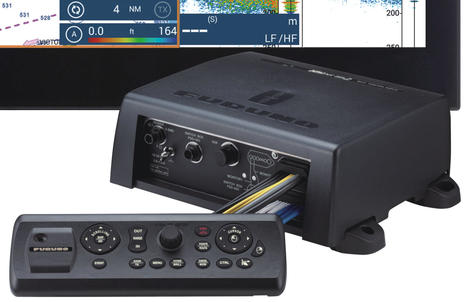 The NavNet TZtouch2 Black Box (TZT2BB) is fairly similar to the original and still-available NavNet TZtouch Black Box (TZTBB). One exception is dual HDMI monitor outputs (instead of DVI), along with the ability to support different screen resolutions on each, right up to the FHD 1920 x 1080 pixels being scaled even higher on that wild Hatteland 55-inch "Chart Table" in the Miami booth. In fact, I'm beginning to wonder if TZT2 will entirely replace TZT pretty soon?
The NavNet TZtouch2 Black Box (TZT2BB) is fairly similar to the original and still-available NavNet TZtouch Black Box (TZTBB). One exception is dual HDMI monitor outputs (instead of DVI), along with the ability to support different screen resolutions on each, right up to the FHD 1920 x 1080 pixels being scaled even higher on that wild Hatteland 55-inch "Chart Table" in the Miami booth. In fact, I'm beginning to wonder if TZT2 will entirely replace TZT pretty soon?
When Panbo covered the 2015 TZT2 Miami launch, the new MFDs seemed positioned as less expensive, medium size boat alternatives to the heavy duty TZT hardware. The TZT2 software was also freshly rebuilt on the Android platform and lacked some features. But maybe that strategy is winding down? For instance, some of the missing TZT radar controls noted in Fred Khedouri's 2015 TZT2 review were added with firmware updates, TZT2 got IP video support last June, and the new TZT2BB has HDMI video input.
Furuno is pitching the new TZT2BB as an easy update for the aging NavNet MFDBB (which, after all, was news in 2007). According to the TZT2BB press release, the new keyboard (above) is the exact same size, plus a kit will be available that simply converts the MFDBB keyboard for TZT2BB use. Furuno also makes the general black box case that many helms with perfectly good monitors could use a multifunction navigation processor update, and I'll add the observation that some wheelhouses seem to do fine with economical home or office grade displays (depending on window sizes and monitor placement).
The TZT2BB doesn't have a definite retail price yet, but Furuno says it should be under $6,000 when the box is ready to ship later this spring.
GP-1x17F Plotter Fishfinder
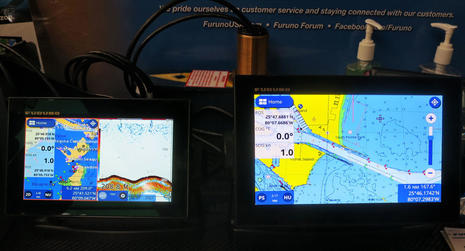 Furuno's new 7-inch GP-1871F and 9-inch GP-1971F were looking bright and modern in Miami. They are multi-touch glass-bridge style displays competitive in many ways with similar size MFDs from the other big brands, but it makes good sense for Furuno to bill the design as a "chart plotter with a built-in CHIRP fishfinder" even if it also supports one radar option.
Furuno's new 7-inch GP-1871F and 9-inch GP-1971F were looking bright and modern in Miami. They are multi-touch glass-bridge style displays competitive in many ways with similar size MFDs from the other big brands, but it makes good sense for Furuno to bill the design as a "chart plotter with a built-in CHIRP fishfinder" even if it also supports one radar option.
That's because these displays do not network with NavNet MFDs and their various Ethernet radars, black box sonars, etc., and they also do not use the TimeZero charting engine seen in NavNet (and elsewhere). Instead, they use C-Map's charting software, including all features up through C-Map 4D, and are reportedly manufactured by C-Map, as were predecessor plotter/fishfinder models like the GP1870F. But there's clearly some Furuno/C-Map collaboration showing in added features and the new interface.
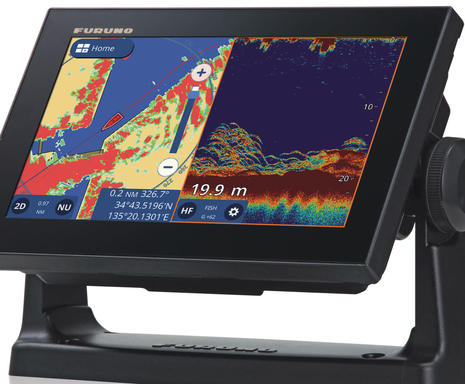 For instance, the GP-1x71F displays can integrate over WiFi with a Furuno DRS4W 1st Watch Radar. When this inexpensive radome first came out I wondered if a stand-alone iPad radar made sense, but then the Nobeltec/MaxSea TimeZero charting app integrated with it, and now you can use it on a waterproof 7- or 9-inch display with a 1,000 cd/m2 (nits) of brightness. In fact, the TimeZero iPad app and the new GP plotter/fishfinders will apparently have a relationship even without a radar involved, though the details aren't spelled out yet.
For instance, the GP-1x71F displays can integrate over WiFi with a Furuno DRS4W 1st Watch Radar. When this inexpensive radome first came out I wondered if a stand-alone iPad radar made sense, but then the Nobeltec/MaxSea TimeZero charting app integrated with it, and now you can use it on a waterproof 7- or 9-inch display with a 1,000 cd/m2 (nits) of brightness. In fact, the TimeZero iPad app and the new GP plotter/fishfinders will apparently have a relationship even without a radar involved, though the details aren't spelled out yet.
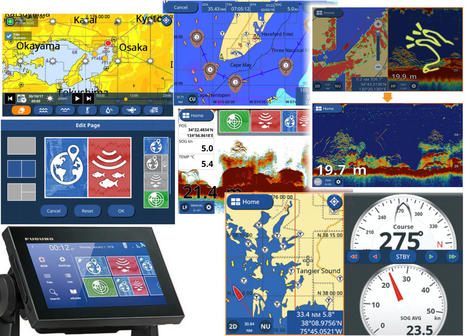 The new GP-1x71F interface has various TZT2-like features such as slide-out menus and the slick screen page creation system seen in the collage above (worth clicking bigger). Note too the C-Map online weather screen, touch-friendly waypoint management, and a multi-touch method of making a function window go full screen. And especially note the Furuno autopilot control seen lower right as that seems part of the bigger plan.
The new GP-1x71F interface has various TZT2-like features such as slide-out menus and the slick screen page creation system seen in the collage above (worth clicking bigger). Note too the C-Map online weather screen, touch-friendly waypoint management, and a multi-touch method of making a function window go full screen. And especially note the Furuno autopilot control seen lower right as that seems part of the bigger plan.
Again retail pricing is not definite yet, but expect about $1,195 for the GP-1871F and $1,695 for the GP1971F.
NavPilot-300 with gesture control
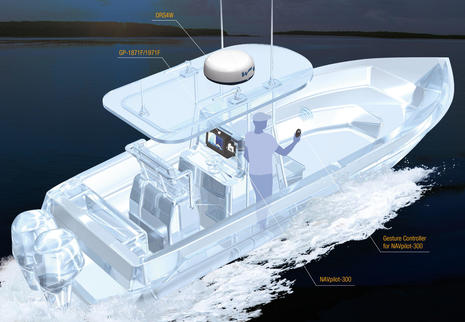 Here's a Furuno vision of a center console set up with the new GP-1x71F, the DRS4W radome, and the new NAVpilot-300, which seems particularly aimed at outboards with "Fantum feedback" simplifying the install and even the processing unit waterproof. While a lot of the features are shared with the NavPilot 711C/OB, truly novel is the wireless Gesture Controller included in the $1,550 retail base price ($2,145 with PG700 Heading Sensor).
Here's a Furuno vision of a center console set up with the new GP-1x71F, the DRS4W radome, and the new NAVpilot-300, which seems particularly aimed at outboards with "Fantum feedback" simplifying the install and even the processing unit waterproof. While a lot of the features are shared with the NavPilot 711C/OB, truly novel is the wireless Gesture Controller included in the $1,550 retail base price ($2,145 with PG700 Heading Sensor).
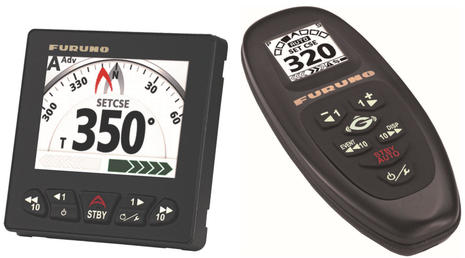 The NavPilot 300 processing unit uses NMEA 2000 to communicate with its color control head, and with the control apps on TZT2 or GP-1x71F displays, but it's Bluetooth that connects the handheld. And besides being a pretty snazzy autopilot remote with its own small screen, the Gesture Controller senses heading or at least motion so that it can be used to point the autopilot to a new course without thinking about how many degrees left or right that is, and then how many button pushes are needed.
The NavPilot 300 processing unit uses NMEA 2000 to communicate with its color control head, and with the control apps on TZT2 or GP-1x71F displays, but it's Bluetooth that connects the handheld. And besides being a pretty snazzy autopilot remote with its own small screen, the Gesture Controller senses heading or at least motion so that it can be used to point the autopilot to a new course without thinking about how many degrees left or right that is, and then how many button pushes are needed.
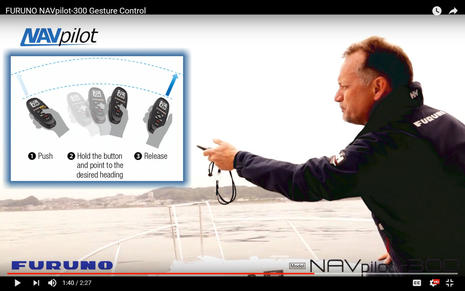 Furuno's Eric Kunz demonstrates gesture control in this video and it does indeed look easy, and particularly useful for a fisherman busy away from the helm and maybe even using the 300's "Sabiki Mode" to steer stern-to wind or current while working a hot spot. So, yes, Furuno's new smaller boat electronics suite is aimed at the fishing crowd, but Sabiki is also useful for waiting on bridges (as shown in the 711C demo video). Add the cruising prowess of C-Map 4D, plus optional radar, and Furuno's center console vision could serve as all around system.
Furuno's Eric Kunz demonstrates gesture control in this video and it does indeed look easy, and particularly useful for a fisherman busy away from the helm and maybe even using the 300's "Sabiki Mode" to steer stern-to wind or current while working a hot spot. So, yes, Furuno's new smaller boat electronics suite is aimed at the fishing crowd, but Sabiki is also useful for waiting on bridges (as shown in the 711C demo video). Add the cruising prowess of C-Map 4D, plus optional radar, and Furuno's center console vision could serve as all around system.
Finally, and definitely going back to Furuno's commercial roots, consider the new LH-5000 Loud Hailer. The LH-3000 was already heavy duty, but this new model brings the fore and/or aft hailing power up to 30 watts and the number of intercom channels to six with custom naming possible on that monochrome display. So "IC5" could be labeled as "ENGINE RM" or "BEN BERTH" and it's possible to alarm all stations with a single button or a wired relay input.
While I value fly-bridge-to-main-cabin intercom on Gizmo -- and get it nicely these days while testing the Icom M605 and CommandMicIV -- the $995 LH-5000 is a utility audio beast that might serve well on, say, a big crab fishing boat and will likely endure Deadliest Catch conditions for a long time. Which speaks to Furuno's core market territory and old school reputation. But think about the range of other new products discussed here -- Android swiping interfaces, big and small, to point and shoot AP control; Furuno does not easily fit in any slot.

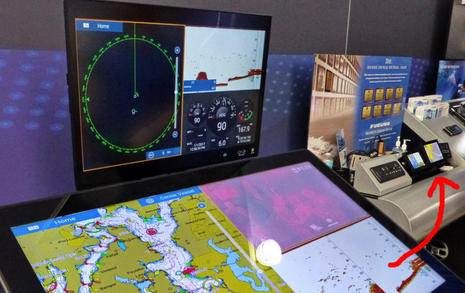
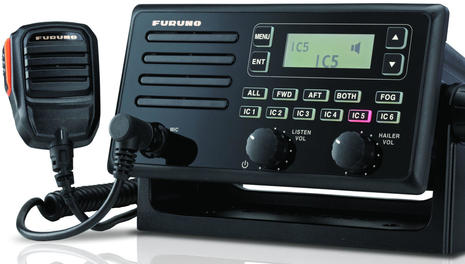
 Share
Share
Great to see Furuno is another company that understands that features such as autopilot are there to help the skipper and that adding unnecessary 'confirming' button pushes is not helpful. I have long disagreed with Raymarine's unique view that autopilots have to be hobbled with confirmation button presses when it is simply following a pre-configured route. I am currently assessing which pilot to fit alongside my Raymarine plotters and radar. I think Furuno may have now come into play ... along with Simrad.